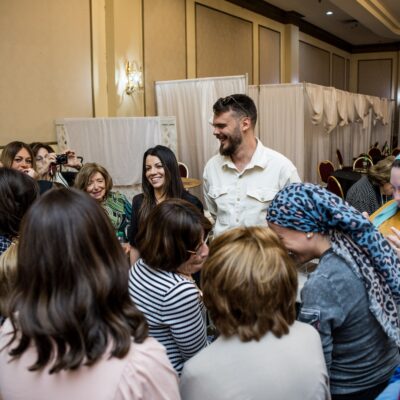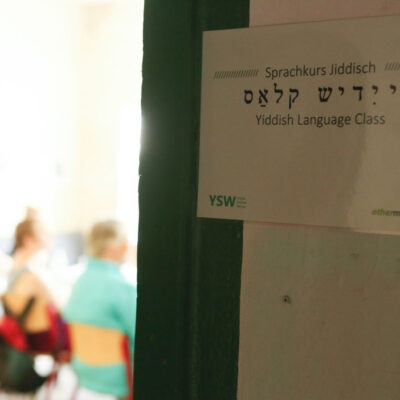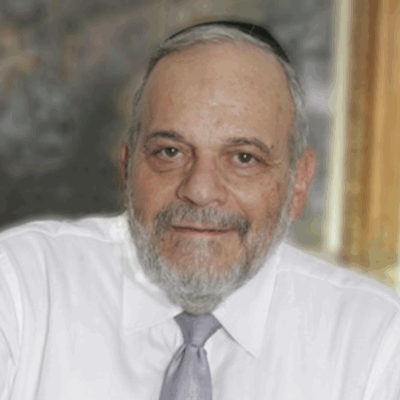Your Daily Phil: Welfare cuts to strain philanthropic sector, Jewish groups warn
Good Monday morning.
In today’s edition of Your Daily Phil, we report on the Jewish philanthropic community’s reaction to the “One Big, Beautiful Bill,” and on the expansion of the partnership between the Jewish Theological Seminary and Barnard College. We feature an opinion piece by Rabbi Rebecca W. Sirbu arguing for funders to support Jewish family services, and another by Holly Cohen and Mike Leven about the need to strengthen Jewish identity through day school education. Also in this issue: Daniel Goldman, Ofer Calderon and Andre Danesh.
- Israeli Prime Minister Benjamin Netanyahu landed in the United States early this morning for a meeting later today with President Donald Trump.
- The Dinah Project, an Israeli organization raising awareness about the sexual violence that was inflicted during the Oct. 7 terror attacks, is presenting a new report on the matter tomorrow to Israeli First Lady Michal Herzog at the President’s Residence in Jerusalem.
What You Should Know
The budget reconciliation bill, formerly known as the “One Big, Beautiful Bill Act,” narrowly passed the House on Thursday, ending its monthslong trek to President Donald Trump’s desk, where it was signed into law on Independence Day, reports eJewishPhilanthropy’s Nira Dayanim.
According to Andres Spokoiny, president and CEO of the Jewish Funders Network, while the bill’s specific impact on Jewish philanthropy will take time to emerge, funders already feel squeezed by the compounded pressure of multiple wars in Israel, national political divisions and other factors.
“It’s a quadruple whammy, or quintuple whammy, really,” Spokoiny told eJP, referring to his initial description of the bill last month as a potential “double whammy” to the philanthropic sector. “You have increased costs of living. You have services and federal programs being cut, which affect the 25% of Jews who live below the poverty line. You have restrictions on philanthropic activity. You have the crisis in Israel that demands a lot of resources, and you have somebody who is likely to be in charge of New York City, threatening both spiritually, morally and economically, the Jews of the city, among them many philanthropists. So these are difficult times,” Spokoiny said, referring to Zohran Mamdani, the Democratic candidate for New York City mayor.
Two provisions that remain in the bill — a 35% cap on itemized deductions and a new requirement for corporations to donate at least 1% of their profits to be eligible for tax benefits — are expected to pinch philanthropic giving, according to research by the Indiana University Lilly Family School of Philanthropy, which estimated that these tax changes would result in an annual decrease of between $6.2 billion and $13 billion in charitable donations.
But the bill’s most significant impact on private philanthropy could be in raising the level of need for it to meet, due to cutbacks on welfare programs including Medicaid and SNAP, experts say. For instance, while the original bill proposed $800 billion in cuts to Medicaid over 10 years, the newest iteration will see over $1 trillion in cuts. Over the same period, the bill will also cut over $200 billion from SNAP.
Private philanthropy might attempt to fill the gap left by a rollback in federal funding, but it would amount to a drop in the bucket, David Goldfarb, senior director of the Jewish Federations of North America’s Strategic Health Resource Center, told eJP. “You really can’t compete with federal funding,” he said.
Some progressive Jewish groups have denounced the sweeping tax bill for its cuts and new restrictions on welfare benefits. Darcy Hirsh, senior director of government relations and advocacy at the National Council of Jewish Women, also noted that the bill includes less-discussed cuts to reproductive health care. “This budget will also end access to reproductive health care for millions of women by defunding and shuttering clinics across the country — which are, for many, the sole source of cancer screenings, STI testing, and prenatal care in their area. Buried in a massive bill filled with sweeping cuts, this attack on reproductive health care is intentional — designed to pass unnoticed as just another line item,” Hirsh said.
Some Jewish groups have hailed the Educational Choice for Children Act, a provision that will provide a tax credit for donations to scholarship granting institutions — including religious schools — as a boon for the broader Jewish community, if not the philanthropic sector specifically. “The OBBB is big and complicated, but one thing is simple: The largest ever federal school choice program is about to be signed into law by President Trump,” said Nathan Diament, the executive director of OU Advocacy. “This has been an OU Advocacy goal for decades, and we will continue to work to make sure every Jewish child can access an affordable Jewish education.”
According to David Greenfield, CEO of Met Council, his organization and others that provide food to food pantries are set up as additional support for those who already have SNAP benefits. As fewer people are able to receive those benefits, the demand could increase dramatically.
“[The need is] impossible to absorb,” Greenfield said. “There’s no one who believes that suddenly we’re going to get $250 billion a year in new private philanthropic funding. So what this really means is that the social safety net in the United States is being significantly eroded for people at the lowest income.”
Though the bill is likely to further strain the philanthropic sector, it is expected be a boon to philanthropists. According to the Institute on Taxation and Economic Policy, the new tax cuts are estimated to save the top 1% of families more than $1 trillion over the next 10 years.
EXCLUSIVE
All Barnard students permitted to take JTS courses, in expansion of partnership

Beginning this fall, all Barnard College students will be permitted to take courses at the Jewish Theological Seminary as part of an expanded initiative announced on Monday that builds on the school’s existing dual-degree program, Jewish Insider’s Haley Cohen reports for eJewishPhilanthropy.
Better together: Jewish studies courses at JTS — located near Barnard’s Morningside Heights campus — will now count toward Barnard degree requirements, with students able to participate with no additional tuition costs. The partnership comes as Barnard — which is closely affiliated with Columbia University but has independent administration and affiliation — is under investigation by the Trump administration for violating Title VI by not addressing harassment of Jewish students. Shuly Rubin Schwartz, chancellor of JTS, said in a statement that the new partnership will build on the longtime Barnard-JTS program, which “has a distinguished history, with outstanding alumni who have made tremendous contributions to American Jewish life, as rabbis, institutional leaders, physicians, attorneys, and more.”
MORAL OBLIGATION
There is something you can do to protect the vulnerable

“We are in the midst of incredibly turbulent times. It’s easy to get discouraged and be overwhelmed. But in the face of fear and uncertainty, Jewish philanthropy can offer something powerful: concrete help to those most in need. Among the most overlooked, but most urgent, needs is the growing economic insecurity within our own Jewish community,” writes Rabbi Rebecca W. Sirbu, executive vice president of the Jewish Funders Network, in an opinion piece for eJewishPhilanthropy.
Three rights: “Some may argue in this time of increased Jewish need, that because these agencies serve so many non-Jews, the Jewish philanthropic sector is justified in its prioritization of other ‘more Jewish’ issue areas. This assertion hurts our community in three ways. First, it will allow Jews who cannot access services to suffer and feel greater isolation, which runs counter to our values. Second, while it’s true that in some cases agencies have become ‘vendors’ of the state, doing so builds their capacity and allows them to provide programs to, say, Holocaust survivors. Third, it is simply the right thing to do. An added benefit of doing the right thing is that providing services to the non-Jewish population is a clear way to fight the current rise in antisemitism and build stronger and safer communities.”
RISE ABOVE
They hate us? Let’s raise kids who don’t care — because the future belongs to Jews who love being Jewish

“As Israel’s bold actions against Iran reverberate across the globe, the message is unmistakable: Jewish survival is not passive. Jews are not weak, and we are not helpless. We act — strategically, intelligently, unapologetically. … The Jewish story cannot be one of pleading for safety or appeasing the haters. Jewish life will not be lived on its knees. It must be a story of power, built through confident Jewish children and strong communities that know and celebrate who they are and why they matter. That’s what survival looks like. That’s how we fight antisemitism,” write Holly Cohen, founder and CEO of the Chabad-inspired Tamim Academy, and Mike Leven, founder of the Jewish Future Promise, in an opinion piece for eJewishPhilanthropy.
New schools needed: “Today, there are approximately 1.6 million Jewish children in North America, yet only about 2% of those from non-Orthodox homes attend Jewish day school… While Jewish day schools are seeing some uptick in enrollment after years of decline, the existing schools simply don’t have the space to accommodate the numbers we must reach. To do that, we need more schools. Everywhere Jewish families live, we need Jewish schools.”
Worthy Reads
Identity Crisis: In an extended piece in the British Jewish Fathom Journal, Daniel Goldman examines the development of an extreme form of Religious Zionism from Rabbi Avraham Isaac Kook’s more pluralistic, mystical theology to a pervasive militant ideology. “The systematic erosion of institutional mechanisms for addressing Jewish extremism, combined with the political empowerment of radical voices, creates an environment where moderate positions become increasingly difficult to maintain. It is also hard to ignore the effects of decades of terror and intransigent Palestinian leadership which has created deep scepticism of the possibility of any true peace between Israel and Palestine. … The convergence of mystical theology, political power, social normalisation, and historical precedent creates an unprecedented danger. The theological framework has become political orthodoxy; the rhetoric has shifted from margins to mainstream; the policies are being implemented with state power. … Israeli society, and in particular the religious Zionist sector, must promote ideas that can compete with and defeat these radical concepts.” [Fathom]
Resource Development: In Psychology Today, Rabbi Elan Babchuck and Rebecca Leeman discuss how organizations can better support their Jewish employees. “One-third of Jewish employees feel unsafe being openly Jewish at work, and more than half of respondents (56%) don’t feel supported by their employer to express their Jewish identity. … Nearly half of the [employee resource group] members from the survey sample joined after October 7, 2023, demonstrating the increasing importance of these groups in fostering connection and resilience. … Strikingly, only 61% of participants felt that their companies were supporting their Jewish ERG efforts. … So, what can leaders do? One approach is to prioritize the creation of peer networks for your Jewish employees through the launch of Jewish ERGs or affinity groups. … Many Jewish employees say they are exhausted by having to constantly explain Judaism and/or their relationship to Israel. If your company offers other identity-based cultural training, include Jewish identity and antisemitism awareness training. … Thoughtful engagement today can lead to a stronger, more inclusive, and more productive workplace tomorrow.” [PsychologyToday]
Believing vs. Being: In a blog post on the London-based Jewish Policy Research think tank’s website, researchers David Graham and Adina Bankier-Karp consider American Jews’ greater belief in God compared to British Jews’ greater participation in Jewish life. “Only one in six American Jews say they don’t believe in God. In the UK, it’s notably higher, at one in four. … And yet this American religious piety hasn’t translated into a deeper Jewish identity. On any number of measures, the average American Jew is found wanting. They’re less attached to Israel (58% vs. 73%), less likely to keep a kosher home (17% vs. 40%), more likely to intermarry, and far less likely to say that most of their friends are Jewish. Fewer American Jews have attended Jewish schools. Fewer live in Jewish neighbourhoods. Fewer share Jewish life with other Jews. Why? Perhaps because in America, the individual reigns supreme. Religion is viewed as a private matter and, for many, it seems it is virtually divorced from being Jewish, at least in the social-communal sense of the word. … [In] the end, being Jewish isn’t just about believing, it’s also about belonging—to a people, a story, a community—and behaving in Jewish ways, not because it’s a lifestyle choice but because it is a big part of what Jews do and who Jews are. It seems the Brits may have something rather important to discuss with their American cousins, and perhaps even something to teach.” [JewishPolicyResearch]
Word on the Street
Israel’s governing coalition is reviving a bill to curtail the country’s Law of Return by removing the so-called “grandchild clause,” which grants Israeli citizenship to anyone with at least one Jewish grandparent…
Haaretz examines the growing number of Israeli Reform and Conservative rabbis who are leaving the country to lead congregations abroad, mainly in North America…
A crowdfunding campaign that launched on Friday to support freed Israeli hostage Ofer Calderon, who was kidnapped along with two of his children on Oct. 7, 2023, and released in February, has raised nearly $1.1 million as of this morning, largely driven by a viral social media post by his cycling group…
Australian police arrested a man suspected of throwing a Molotov cocktail at a Melbourne synagogue over the weekend while some 20 people were inside…
Victoria, Australia, Premier Jacinta Allan announced the creation of a new anti-hate task force following the firebombing of the synagogue and the vandalism of an eatery in the city owned by Shahar Segal, a now-former spokesperson for the Gaza Humanitarian Foundation; Australian Prime Minister Anthony Albanese vowed to apply the “full force” of the law against “those responsible for these shocking acts”…
The final results of the World Zionist Congress elections in Canada have been delayed by three weeks due to an ongoing fraud investigation…
The Times of Israel spotlights the efforts of the Koret Israel Economic Development Fund, which has been providing low-interest loans to war-ravaged Israeli small businesses…
The Jewish Federation of Greater Washington announced a new round of more than $378,000 in emergency relief grants for Israeli causes following the country’s war with Iran last month…
Kansas City’s Jewish Community Foundation’s Community Legacy Fund announced $117,045 in “innovative and emergency grants” to local organizations…
Colorado has allocated an additional $250,000 in nonprofit security grant funding to help protect synagogues, mosques, churches and other houses of worship in the state following last month’s firebombing attack on an Israeli hostage solidarity march…
The Times of Israel reports on a new study by Hebrew University’s Institute for the Study of Civil Society and Philanthropy on the role of civil society and volunteer organizations during the Israel-Iran war…
Columbia University is continuing negotiations with the Trump administration to restore hundreds of millions of dollars in federal funding and grants; recent conversations have not included discussion of a “consent decree” that had previously been considered, under which a federal judge would have oversight of the school’s compliance with the terms of a potential agreement…
The Boston-area Brookline.News spotlights Andre Danesh, 91, an Iranian-born American Jew who has dedicated his research and $1 million toward efforts to create artificial blood…
The New York Times looks at an ongoing decades-long effort to locate and return a Stradivarius violin to the descendants of the Jewish family who had owned the violin until it was looted near the end of World War II…
The Bank of Israel will hold its interest rates at 4.5% for the 12th consecutive time, amid the shekel’s rally following last month’s ceasefire between Israel and Iran…
The Washington Post looks at efforts by members of the Syrian Jewish diaspora to restore sites and rebuild connections inside Syria, whose Jewish population was just six people following the fall of the Assad regime…
The Jewish Telegraphic Agency profiles American Jewish historian Jonathan Sarna as he retires…
Correction: The July 3 edition of Your Daily Phil incorrectly stated that this year’s World Zionist Congress elections in Australia were the country’s first direct vote for the international parliament; the first direct election for the congress was held in 1971, but this was later changed to an allocation model based on the sizes of local Zionist organizations…
Transitions
Rabbi Matt Marks has been named the next head of Tribe, the youth wing of the British Orthodox umbrella organization United Synagogue…
The Governing Council of Spain’s Sefarad-Israel Center appointed José Eugenio Thovar to serve as the next director general of the institution, which was created by the Spanish Foreign Ministry, Jewish community of Madrid and the Madrid City Council to deepen Spanish-Jewish ties…
The Elkins Park, Pa.-based Holocaust Awareness Museum and Education Center promoted Fabulous Flores, its education director, to serve as its CEO…
Sandy Myers Grawert has been promoted to vice president of communications at Hillel International…
Dana Toppel and Theresa Dupuis are taking the helm of Jewish Family Service of San Diego as CEO and board chair, respectively…
Elisheva Baumgarten was elected dean of the faculty of humanities at the Hebrew University of Jerusalem…
Pic of the Day

Fifty-four French women receive their Israeli identity cards in the Knesset yesterday after making aliyah through a program called Zehut, which fast-tracks the immigration of French participants in Masa programs. The ID card ceremony was attended by Israeli Immigration Minister Ofir Sofer (center) and Jewish Agency Chairman Doron Almog (center right).
Birthdays

Head coach of the Florida Gators men’s basketball team that won the NCAA national championship last season, Todd Raymond Golden…
Retired president of The Seeing Eye, the world’s premier guide dog school for the blind, Kenneth Rosenthal… Early collaborator on object-oriented computer programming in the 1970s, Adele Goldberg… Cardiologist and former president of CRIF, the umbrella organization of French Jews, Richard Prasquier … Michigan-based real estate developer, he served as U.S. ambassador to Slovakia during the Bush 43 administration, Ronald N. Weiser… Board member of the Israel Policy Forum, he spent 27 years as a bankruptcy attorney at Cooley LLP, Lawrence C. Gottlieb… Israeli businessman with vast holdings in energy (Delek Group) and real estate (El-Ad Group), Yitzhak Tshuva… Former president of Hebrew University and a past member of the Knesset, Menachem Ben-Sasson… Co-founder and CEO of the biotechnology company Regeneron Pharmaceuticals, Leonard Steven Schleifer… Pioneer of Israeli punk rock, nicknamed “HaMeshuga,” Rami Fortis… USAID official for 28 years until 2008, he now consults internationally on Rule of Law issues, Richard Gold… President of The Lapin Group, Avrum Lapin… Rosh yeshiva of Yeshivat Har Etzion located in Alon Shvut, Rabbi Mosheh Lichtenstein… Academy Award-winning screenwriter, director, and producer, Akiva Goldsman… President of the United Synagogue of the U.K., Michael Howard Goldstein… President and CEO of HIAS since 2013, he first joined HIAS in 1989 as a caseworker in Rome, Mark Hetfield… Comic book creator and a cappella singer, he published the Passover Haggadah Graphic Novel, Jordan B. Gorfinkel… Chief judge of the U.S. Court of Appeals for the 1st Circuit, David Jeremiah Barron… Television and film actress, Robin Weigert… Azerbaijani-born businessman, he is a vice president of the Russian Jewish Congress and the president of the International Charity Foundation of Mountain Jews, German Zakharyayev… Communications director for the Democratic Majority for Israel since 2019, Rachel Rosen… Consultant and project manager for nonprofits, Amy Handman… WNBA player in her 13th season, she has also played on Israeli teams for six seasons, Alysha Angelica Clark… Ethiopian-born Israeli actress, Netsanet Mekonnen… Prime Video analytics expert on “Thursday Night Football,” Sam Schwartzstein… Olympic sports sailor, she competed for Israel in both the 2012 and 2016 Summer Olympics, Gil Cohen… Originally a figure skater and later a pairs skater, now a skating coach, Megan Wessenberg… Shalom Klein… U.S. editor at Jewish Insider, Danielle Cohen…









